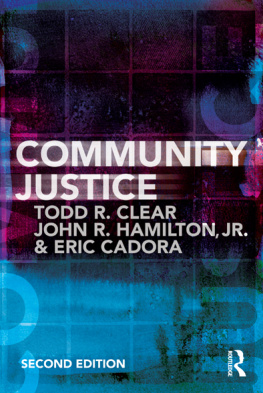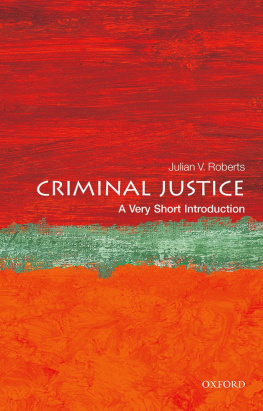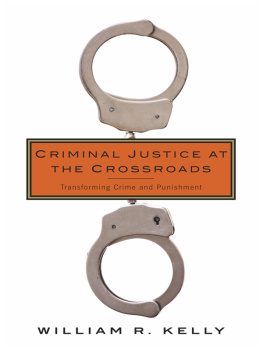Community Justice
Community Justice discusses concepts of community within the context of justice policy and programs, and addresses the important relationship between the criminal justice system and the community in the USA.
Taking a bold stance in the criminal justice debate, this book argues that crime management is more effective through the use of informal (as opposed to formal) social control. It demonstrates how an increasing number of criminal justice elements are beginning to understand that the development of partnerships within the community that enhance informal social control will lead to a stabilization and possibly a decline in crime, especially violent crime, and make communities more liveable. Borrowing from an eclectic toolbox of ideas and strategies community organizing, environmental crime prevention, private public partnerships, justice initiatives Community Justice puts forward a new approach to establishing safe communities, and highlights the failure of the current American justice system in its lack of vision and misuse of resources.
Providing detailed information about how community justice fits within each area of the criminal justice system, and including relevant case studies to exemplify this philosophy in action, this book is essential reading for undergraduate and postgraduate students of subjects such as criminology, law and sociology.
Todd R. Clear is Dean of the School of Criminal Justice at Rutgers University, Newark NJ, USA. He is a past president of the American Society of Crimin ology and the Academy of Criminal Justice Sciences.
John R. Hamilton, Jr. is Associate Professor of Criminal Justice Administration at Park University. He retired at the rank of Major from the Kansas City, Missouri Police Department after 26 years of service. He has extensive experience in community policing and problem solving, and is also a member of the Board of Directors for Synergy Services, Inc.
Eric Cadora is founder and director of the Justice Mapping Center. Prior to establishing the Center, he has served as Program Officer for The After Prison Initiative at the Open Society Institute; as director for Research and Policy, Court Communications, and Day Centre divisions of the Centre for Alternative Sentencing and Employment Services (CASES); and has also conducted graduate work at New York University.
Community Justice
Second edition
Todd R. Clear, John R. Hamilton, Jr.
and Eric Cadora

LONDON AND NEW YORK
First edition published 2003
Second edition published 2011
by Routledge
2 Park Square, Milton Park, Abingdon, Oxon OX14 4RN
Simultaneously published in the USA and Canada
by Routledge
270 Madison Avenue, New York, NY 10016
Routledge is an imprint of the Taylor & Francis Group, an informa
business
This edition published in the Taylor & Francis e-Library, 2011.
To purchase your own copy of this or any of Taylor & Francis or Routledges collection of thousands of eBooks please go to www.eBookstore.tandf.co.uk.
2011 Todd R. Clear, John R. Hamilton, Jr. and Eric Cadora
The right of Todd R. Clear, John R. Hamilton, Jr. and Eric Cadora to be identified as authors of this work has been asserted by them in accordance with sections 77 and 78 of the Copyright, Designs and Patents Act 1988.
All rights reserved. No part of this book may be reprinted or reproduced or utilized in any form or by any electronic, mechanical, or other means, now known or hereafter invented, including photocopying and recording, or in any information storage or retrieval system, without permission in writing from the publishers.
British Library Cataloguing in Publication Data
A catalogue record for this book is available
from the British Library
Library of Congress Cataloging in Publication Data
A catalog record for this book has been requested
ISBN 0-203-85580-9 Master e-book ISBN
ISBN: 978-0-415-78026-1 (hbk)
ISBN: 978-0-415-78027-8 (pbk)
ISBN: 978-0-203-85580-5 (ebk)
To the memory of Dennis Maloney, the heart of community justice. Todd R. Clear, Ph.D. and Eric Cadora
To Bini, Jenifer, and Jessica your support is appreciated. Also to my colleagues Greg, Carol, Ken, and Mike for your encouragement and professionalism.
John R. Hamilton, Jr., Ph.D.
Contents
Preface
This work is an updated version of the Community Justice book that was originally authored in 2003 by Todd Clear and Eric Cadora. It provides updated examples of community justice in practice and continues the belief that community justice is an effective way to build healthy, viable communities.
Community justice borrows from an eclectic toolbox of ideas and strategies: community organizing, environmental crime prevention, publicprivate partnerships, justice initiatives, and so forth. Each of these strategies has its own rich heritage and literature and it is not our intention to provide a comprehensive literature review for any of them. We hope that readers will explore these topics more in-depth on their own and we have provided bibliographies at the end of each chapter that provide suggested readings to learn more about these strategies.
Recent news reports in the United States have told the stories of budgetary cutbacks in federal, state, and local government. With these cutbacks comes the realization that criminal justice agencies will suffer from lack of funding to assist them in achieving their mission. Often times, agencies believe that they must increase staffing to meet the demands the public places upon their organizations. Community justice offer new strategies that can assist criminal justice agencies in not only achieving their mission, but also strengthening partnerships with the community that empowers them. While additional personnel are always welcome in criminal justice agencies, community justice strategies may enable these agencies to achieve more with fewer employees and better weather the effects of the economic downturn. With increased implementation of community justice practices comes more information that can assist criminal justice agencies, academics, and other stakeholders in fine-tuning and improving the delivery of services. The message of community justice is also clear about the need for the private sector and nonprofits to join the partnership to make community justice a reality. The authors believe that community justice is an exciting concept that can make criminal justice agencies more effective and efficient, but we also believe that it is the right thing to do in helping to strengthen communities hard hit by crime, poverty, and malaise. Community justice can be successful if the criminal justice system, government at all levels, the private sector, and nonprofit organizations develop partnerships to address the variety of problems that face hard-hit communities.
In this book the reader will find examples of community justice in practice and case studies that provide more information about specific community justice efforts. In discusses the future of community justice and addresses some of the more common questions that are raised about the concept of community justice. At the end of each chapter the reader will be provided with a list of suggested readings as well as websites that more completely explain some of the concepts discussed in the chapter.
This book would not have been possible without the hard work, dedication, insight and enthusiasm of Todd Clear, Eric Cadora, Charles Swartz, Sarah Bryer, and Joel Copperman, who authored the first version of





